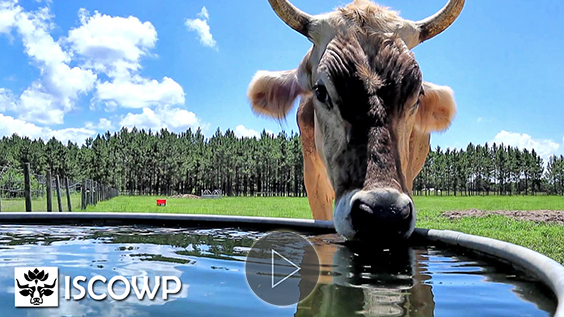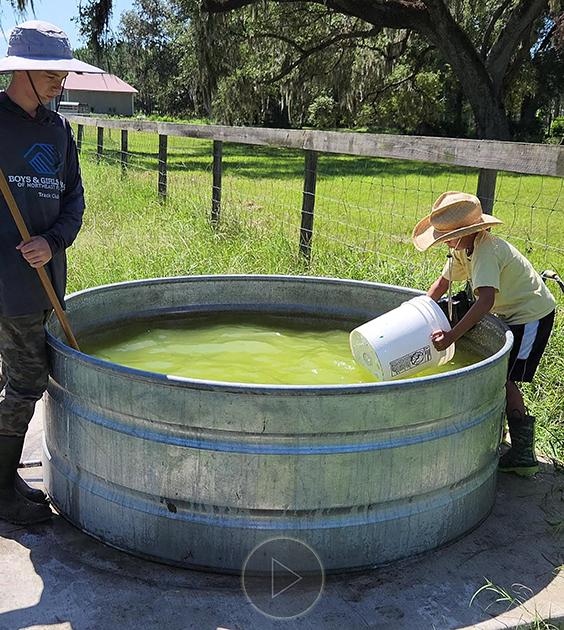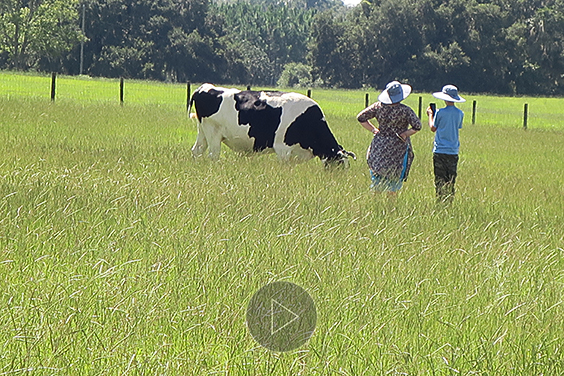- ISCOWP E-newsletters
In 2008, ISCOWP members rescued three cows: Priyavrata, Sri Uddharan Datta Thakur, and Amrita. Balabhadra, the president of ISCOWP...
Due to your generosity, the Matching Gift Challenge for $25,000.00 has been met, and the cows will have enough hay for the winter! Thank you so much for your generosity to the cows! Due to friends and supporters like you, we at ISCOWP have been able to protect cows for 31 years. We are indebted and grateful to you! Thank you, and congratulations!
Across the country, 26 cities recorded their all-time hottest summers in 2022, according to Fox Weather, including Tampa, Florida; Salt Lake City, Utah; and Newark, New Jersey. With such hot days during the summer, the cows take a great deal of comfort from drinking cool, clean water—the water requirements of cows increases during heat stress. Cows lose water from increased respiration and perspiration. Water consumption is the quickest method for cows to reduce their core body temperature. Watch and listen to the ISCOWP herd enjoy a refreshing drink by clicking this video.

We empty and clean the water trough every time the cows move to a new pasture. A clean trough is the best environment for clean water. In addition, cleaning the trough is a service to the cows the younger staff can accomplish. You can view how they clean the trough by clicking the video below.

The National Oceanic and Atmospheric Administration (NOAA) announced on September 9, 2022, that the United States sweltered through its 3rd hottest summer on record in 2022. The average temperature in the contiguous United States this summer was 73.9 F (23.2 C). This temperature is 2.5 degrees above average. The hottest U.S. summer on record for the past 128 years happened last year, 2021, when the average temperature was 74 F (23.3 C). The 2nd hottest was during the Dust Bowl, back in 1936. NOAA made the measurement for meteorological summer, which runs from June 1 to August 31. Just a few days ago, UN Secretary-General Antonio Guterres said the planet is “literally on fire.”

As we approach fall, rain has come almost daily for the last few weeks. These weather conditions produce lush grass in the pastures, which is a delight for the cows. And, it is always a bit cooler after it rains. We practice rotational grazing, which means we keep the herd on half of the available pastures to give the other half time to rejuvenate. Click the video to watch the herd enthusiastically answer the call to fresh pasture.
Our staff’s good health is essential to maintaining ISCOWP’s daily care of the cows it protects and advancing expanding projects. So, we have been hit a bit hard this summer with William Dove’s (Balabhadra, president of ISCOWP) extended recovery from foot surgery. He has not been mobile since May, which has put the labor load on the rest of the staff, mainly Balaji, who fractured his finger at school a week ago.


We have had to pull back from various activities, pooling our energies to prioritize maintaining the cows’ health and happiness. According to the doctors, another two months and Balabhadra can resume normal activities. Since he has been immobile, it will take time to build his stamina.
“Cows produce a lot of heat during ruminal fermentation, digestion, and metabolism of nutrients. This heat must be dissipated so that internal body temperature remains about constant. There are several mechanisms that the cow uses to dissipate heat, including conduction (direct contact with cold objects), evaporative cooling (sweating, panting), and convection (heat dissipates into the surrounding moving air). The efficiency of all these mechanisms gets compromised under high external temperature and humidity, and consequently, internal body temperature starts to rise. Climate conditions have become a stressor, and the cow will respond with several adaptations (increasing respiration rate, decreasing movement, and intake, etc.), which may ultimately compromise cow health and production. The more milk cows make, the greater the metabolic rate, the more heat they produce, and the more heat they must dissipate; that’s why high yielding dairy cows are particularly sensitive to heat stress.” Phibro, Animal Health Corporation

7016 SE 92 Terrace
Gainesville, FL 32641 USA
Phone: 352-792-6777
E-mail ISCOWP
Keep up with the latest news from ISCOWP. Sign up with your e-mail address to receive updates.
"*" indicates required fields
© 2023 This is the only official site of The International Society for Cow Protection, Inc. (ISCOWP) incorporated in 1990, located only in Gainesville, FL, USA. ISCOWP and The Lotus/Cow symbol are registered service marks of The International Society for Cow Protection, Inc. Website content can not be reproduced without permission.